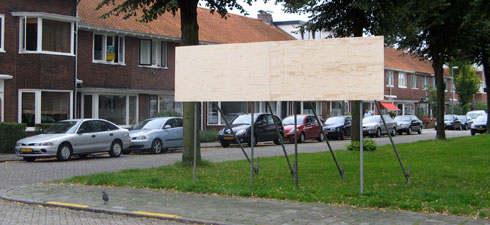Only a month away from the regional and European elections in Belgium, a new controversy is casting a cloud over relations between the country’s Flemish and French-speaking populations. Several communes on the Flemish outskirts of Brussels have recently come out against any election posters in French on their soil, thereby incurring the wrath of the Francophone ranks. In Hal, a police ordinance – an excerpt from which is published in Le Soir – provides that only Flemish parties are allowed to stick their bills on the town hoardings. The authorities in Affligem, for their part, have announced they are going to cover up any election posters in French with sheets of white paper. And, elaborates La Libre Belgique, “Seven communes in BHV (Brussels-Hal-Vilvorde, the only bilingual electoral and judicial district in Belgium) are not going to put up any billboards at all to forestall any publicity in French.”
Whilst the population of Brussels is 90% Francophone, its outskirts are situated in Flanders, where the only official language is Dutch. 100,000-odd French-speakers inhabit these residential suburbs. Their very presence, coupled with special language rights, irks the Dutch-speaking parties, which are calling for the scission of BHV. 15 communes have decided to boycott the June 7 European elections as a sign of protest against the district’s failure to split up the two linguistic communities.
“The Flemish obstructionist manoeuvrings on the outskirts of Brussels, aimed at prohibiting the Francophone candidates from putting up posters, are not just red tape,” comments Le Soir, which goes on to report the mounting indignation of the French-speaking parties. “The president of the Socialist Party’s branch in Brussels, Philippe Moureaux, has vehemently condemned these grotesque and, by the way, totally illegal machinations.” Moreaux says this is tantamount to a “process of political and linguistic cleansing”. La Libre Belgique bluntly terms it “pre-election apartheid” and a “denial of democracy”. “The tension is mounting,” stresses Le Soir, announcing that “the lawyers for the Francophone parties are already weighing up all the possible courses of action” against the local authorities in Hal and Affligem.
The Flemish press, for its part, is lying fairly low on the matter. De Standaard and De Morgen, the two main regional dailies, have basically confined their coverage to relaying the facts. De Morgen, however, does air the views of Lodewijk de Witte, governor of Flemish Brabant, who explains why he hasn’t obliged the seven towns in his province to put up election hoardings, in spite of a circulaire (written directive) from the interior minister requesting that he “take the necessary measures to ensure that the June 7 local and European elections are held in accordance with the law”. Says the governor: “It is my responsibility to see to it that the elections are held in accordance with the law, but there is no law requiring us to put up billboards.” He points out, in passing, that “a circulaire is a recommendation and not a legal instrument”. From here on in, the battle will be played out in the legal arena.
Was this article useful? If so we are delighted!
It is freely available because we believe that the right to free and independent information is essential for democracy. But this right is not guaranteed forever, and independence comes at a cost. We need your support in order to continue publishing independent, multilingual news for all Europeans.
Discover our subscription offers and their exclusive benefits and become a member of our community now!












